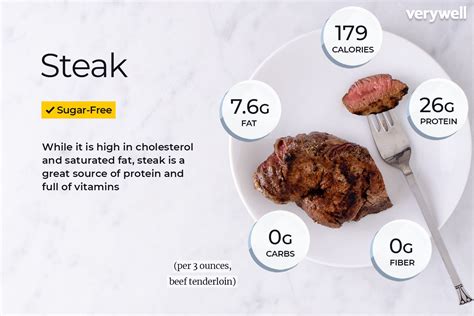Steakhouses are known for their large portions and indulgent flavors. When you order a steak, you're often presented with a slab of meat that's several ounces thick. But have you ever stopped to think about the calorie count of your meal? Specifically, how many calories are in an 8-ounce steak?
In this article, we'll delve into the world of steak and explore the calorie count of an 8-ounce serving. We'll also discuss factors that affect the calorie count, such as the type of steak, cooking method, and added ingredients.

Calorie Count of an 8-Ounce Steak
The calorie count of an 8-ounce steak varies depending on the type of steak and cooking method. Here are the approximate calorie counts for different types of steak:
- Ribeye: 550-650 calories
- Sirloin: 450-550 calories
- Filet Mignon: 350-450 calories
- T-bone: 500-600 calories
- Porterhouse: 600-700 calories
These calorie counts are approximate and can vary depending on the specific cut of meat and cooking method. It's also worth noting that these values are for an 8-ounce serving, which is a relatively large portion.
Factors Affecting Calorie Count
Several factors can affect the calorie count of an 8-ounce steak. Here are some of the most significant factors:
- Type of steak: Different types of steak have varying levels of marbling, which is the amount of fat that's dispersed throughout the meat. Cuts like ribeye and porterhouse tend to have more marbling, which increases the calorie count.
- Cooking method: The cooking method can significantly impact the calorie count of an 8-ounce steak. Grilling or broiling can result in a lower calorie count than frying or sautéing, which adds extra fat.
- Added ingredients: Many steakhouses serve their steaks with added ingredients like butter, oil, or sauces. These ingredients can significantly increase the calorie count of the meal.
Macronutrient Breakdown
In addition to calories, an 8-ounce steak provides a significant amount of protein, fat, and carbohydrates. Here's a breakdown of the macronutrients in an 8-ounce steak:
- Protein: 60-70 grams
- Fat: 20-30 grams
- Carbohydrates: 0-5 grams
The protein content of an 8-ounce steak is significant, making it an excellent option for those looking to increase their protein intake. However, the fat content is also substantial, which can be a concern for those watching their diet.

Health Implications
Consuming an 8-ounce steak on a regular basis can have several health implications. Here are some of the most significant concerns:
- High calorie intake: An 8-ounce steak is a relatively large serving, and consuming it regularly can lead to a high calorie intake. This can result in weight gain and obesity.
- High fat intake: The high fat content of an 8-ounce steak can also be a concern. Consuming high amounts of saturated fat can increase the risk of heart disease and stroke.
- Protein imbalance: While protein is an essential nutrient, consuming excessive amounts can lead to an imbalance in the diet. This can result in kidney damage and other health problems.
Conclusion
An 8-ounce steak can be a delicious and satisfying meal, but it's essential to be aware of the calorie count and macronutrient breakdown. By understanding the factors that affect the calorie count and being mindful of portion sizes, you can enjoy steak as part of a balanced diet.
If you're looking to reduce the calorie count of your steak, consider the following tips:
- Choose leaner cuts of meat
- Use a low-calorie cooking method like grilling or broiling
- Avoid adding extra ingredients like butter or sauces
- Control portion sizes
By following these tips, you can enjoy a delicious and nutritious steak meal without compromising your diet.





FAQs
What is the average calorie count of an 8-ounce steak?
+The average calorie count of an 8-ounce steak is around 500-600 calories.
What factors affect the calorie count of an 8-ounce steak?
+The type of steak, cooking method, and added ingredients can all affect the calorie count of an 8-ounce steak.
Is it healthy to consume an 8-ounce steak regularly?
+Consuming an 8-ounce steak regularly can be detrimental to your health due to the high calorie and fat content. It's essential to consume steak in moderation as part of a balanced diet.
